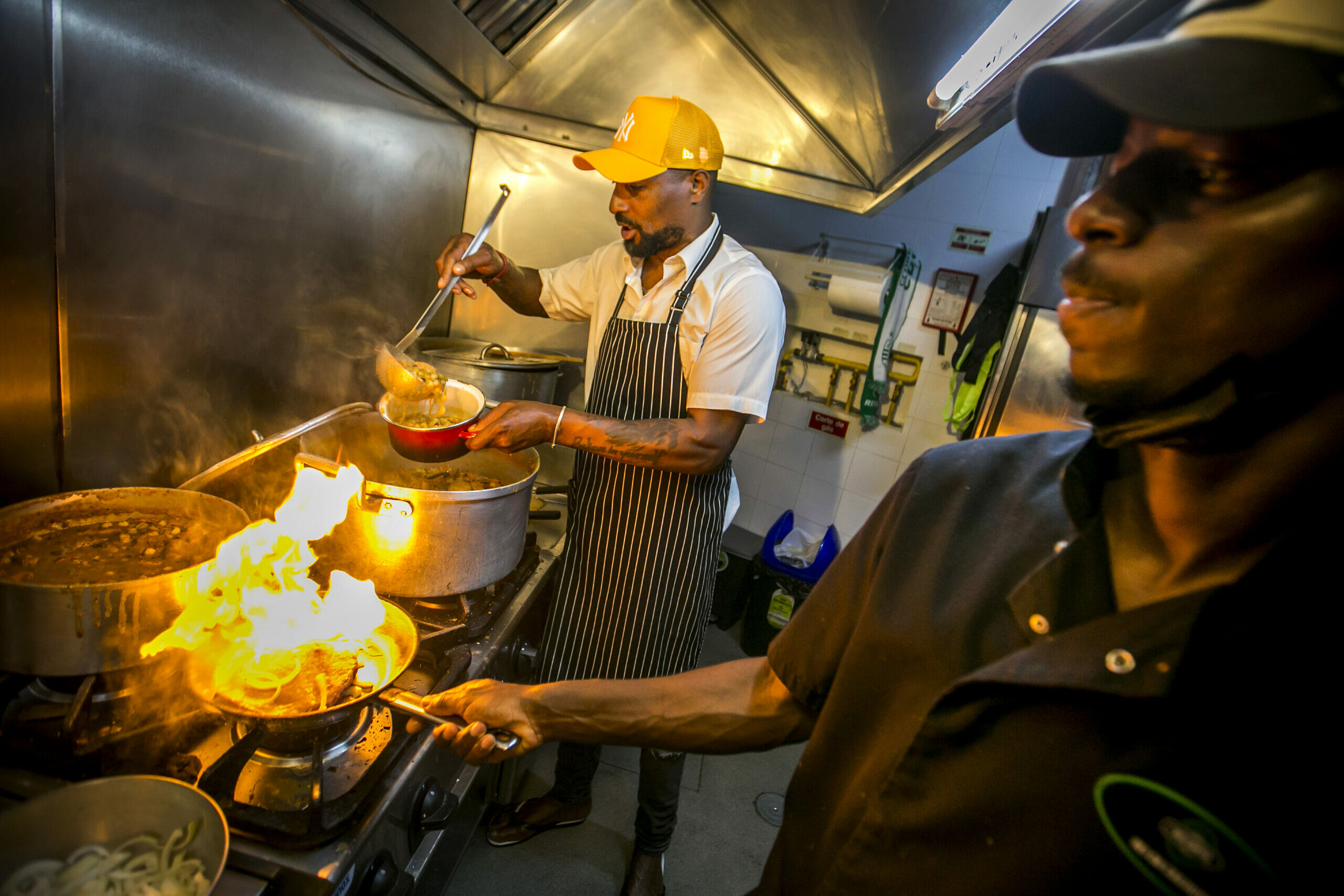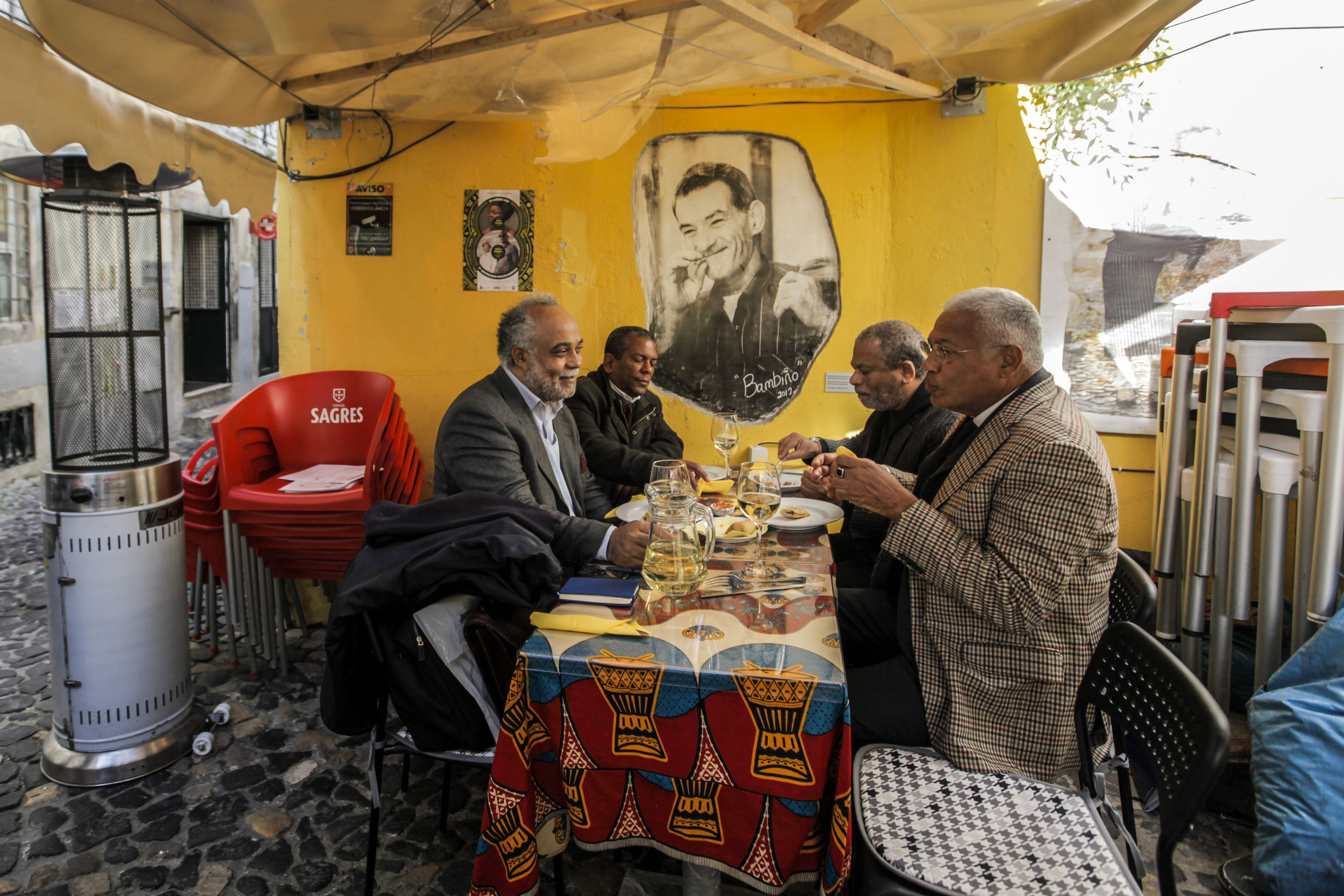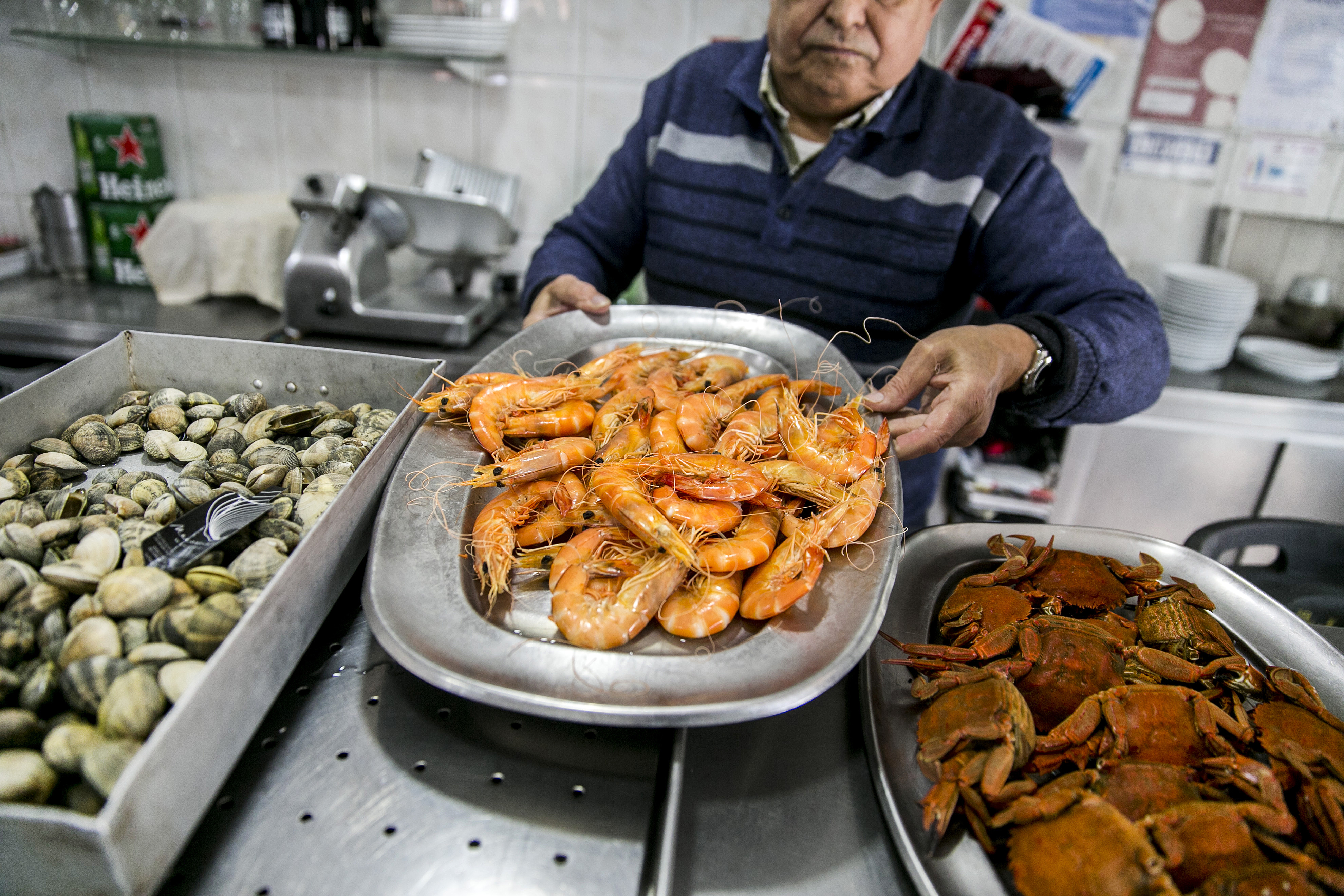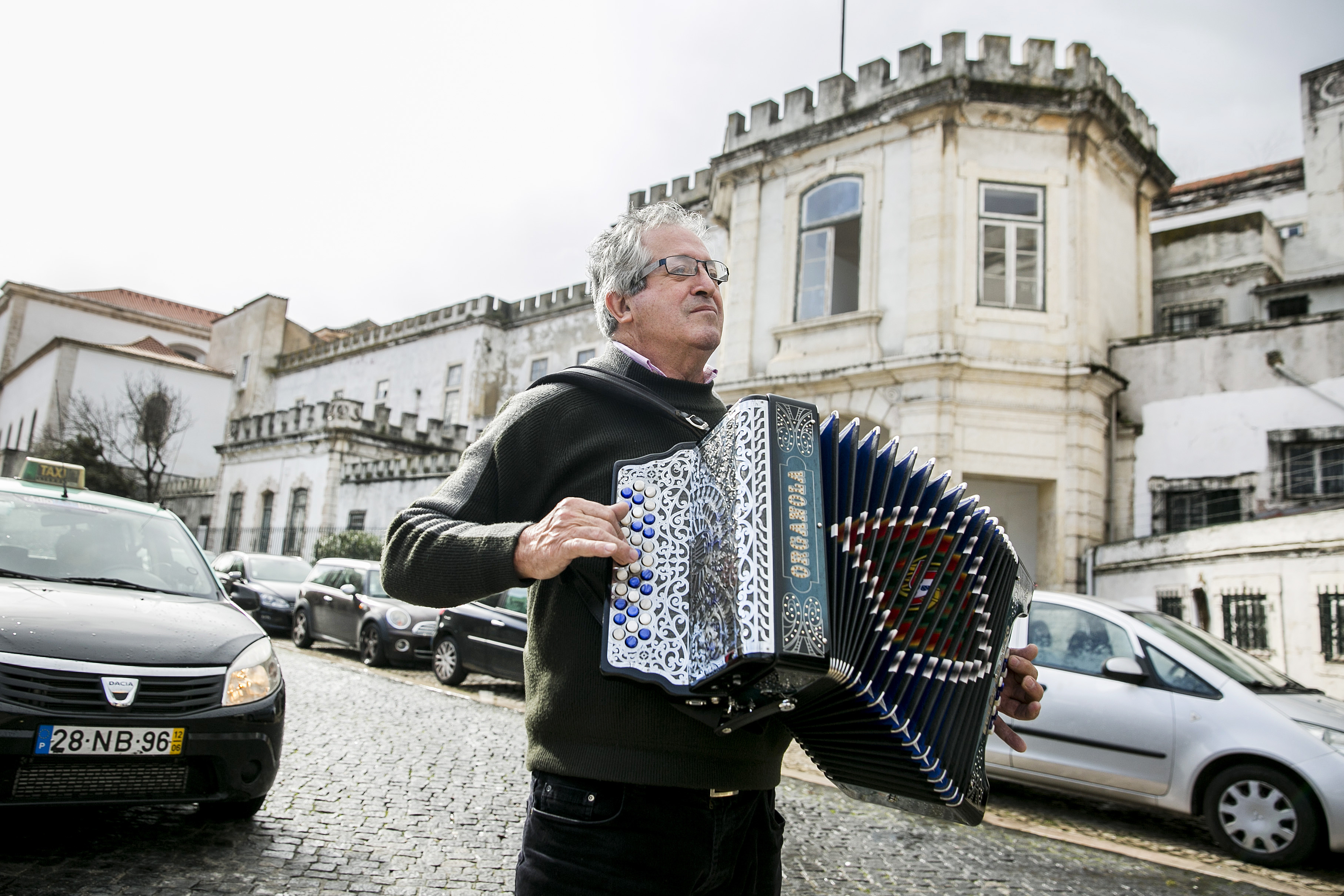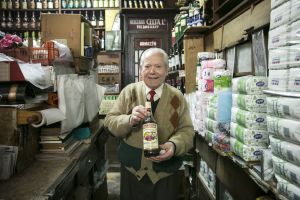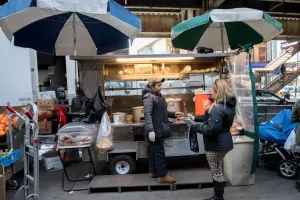A tour to study the cuisines, history and diversity of Portugal’s former colonies and meet the people in the kitchen keeping the traditions of these communities alive.
Lisbon’s Post-Colonial Feast
- Taste many dishes from: Cape Verde, Brazil, Goa and Angola
- Visit Mouraria neighborhood
- Explore diverse, residential neighborhoods
- Taste fish and seafood
We will study the cuisines, history and diversity of Portugal’s former colonies. Get a taste of Cape Verdean cachupa, Brazilian pastries, Goan samosa and Angolan piripiri sauce and meet the people in the kitchen keeping the traditions of these communities alive.
we will explore the complex story of post-colonial Portugal through how it’s expressed in the kitchens of central Lisbon. We’ll start with the signature Cape Verdean stew, cachupa. Packed with hominy, studded with Portuguese chorizo and topped with an egg, the version we’ll try is prepared by the self-proclaimed “King of Cachupa” himself. We’ll have coffee from Angola and chocolate from Sao Tome, learning about these commodities roots in slavery and their current move toward free-trade standards. We’ll visit a shop selling religious icons from Brazil and learn about how African religious traditions were disguised within Catholicism for centuries by colonial subjects of the Portuguese crown.
More than five hundred years ago, Portuguese explorers set out by ship and forever changed the world by opening up trading channels between otherwise disconnected places – Europe to India, West Africa to Brazil and beyond. Spices, coffee, knowledge, gold and, most tragically, enslaved people, filled their ships as fortune and settlements grew. From Brazil in the west to Macau in the East and many points in between, the Portuguese planted their flag creating a direct connection between Lisbon and those distant lands. In colonial kitchens, a hybrid cuisine developed, combining local and Portuguese influences, adding in new materials arriving in the hold of Portuguese ships. Today, almost 50 years after Portugal’s colonial era officially ended, Lisbon benefits immensely from the presence of communities from the country’s former colonies, which are so intertwined with Portuguese history. The story is complicated, the populations diverse and their food, across the board, is delicious.
On this full-day tour, we will explore the complex story of post-colonial Portugal through how it’s expressed in the kitchens of central Lisbon. We’ll start with the signature Cape Verdean stew, cachupa. Packed with hominy, studded with Portuguese chorizo and topped with an egg, the version we’ll try is prepared by the self-proclaimed “King of Cachupa” himself. We’ll have coffee from Angola and chocolate from Sao Tome, learning about these commodities roots in slavery and their current move toward free-trade standards. We’ll visit a shop selling religious icons from Brazil and learn about how African religious traditions were disguised within Catholicism for centuries by colonial subjects of the Portuguese crown.
Though Portuguese language and the Catholic faith were once the cornerstones of Portugal’s colonies, in all of these diverse kitchens the real object of devotion is piripiri, the chili pepper, and we will sample a few versions of the chili-based sauce that reflect a range of tastes, from Africa to Asia. Up one hill and down another, we’ll reward ourselves with the city’s finest shrimp samosa and meet the irreverent chef pushing the boundaries of both Goan and Portuguese cuisines. We’ll visit with street vendors from Guinea, and take in some hidden history on our way to a hip new spot with a Brazilian chef creating modern renditions on the food of his home country, including a puff pastry stuffed with succulent octopus. Finally, sunset will find us in a small Cape Verdean taverna run by the matriarch of her street, where we’ll have a digestive of house-made poncha, sweetened sugar cane liqueur, toasting senhora Maria and the survival of such rich and diverse traditions, all at home in little old Lisbon.
- Guided tour through Plaka and Anafiotika neighborhoods
- Tastings of traditional Greek dishes and local specialties
- Wine tasting featuring small Greek producers
- Transportation to and from the meeting point
Start Location: Praça do Chile, Lisbon, Portugal
End Location: Mouraria, Lisbon, Portugal
- The tour is conducted in English; proficiency is recommended.
- Some stops may not be suitable for individuals with mobility impairments due to stairs and uneven terrain.
- The tour operates rain or shine; dress appropriately for the weather conditions.
- Wear comfortable walking shoes for the cobblestone streets.
- Bring a light jacket or sweater as evenings can be cool.
- Ensure you have a valid ID if you plan to participate in wine tasting.
Cancellation Cutoff: 24 hours
Cancellation Notes: Up to 24 hours before the beginning of the activity: full refund Less than 24 hours before the beginning of the activity or no-show: no refund
| Food Tour - Lisbon’s Post-Colonial Feast Culinary Backstreets | RETAIL PRICE |
|---|---|
| Adult | €135.00 |
| Child (6 - 12 years) | €67.50 |
| Infant (0 - 6 years) | N/A |
- Miradouro do Monte Agudo, Praça Novas Nações, Lisbon, Portugal
- MERCADO DA RIBEIRA, Avenida 24 de Julho, Lisbon, Portugal
- Museu Nacional do Azulejo, Rua Madre Deus, Lisbon, Portugal
- Terrapão, Mercado de Arroios, Rua Ângela Pinto, Lisbon, Portugal
- Miradouro de Santa Catarina, Lisbon, Portugal
- Núcleo Arqueológico da Rua dos Correeiros (Fundação Millennium bcp), Rua dos Correeiros, Lisbon, Portugal
- Miradouro da Penha de França, Rua Marques da Silva, Lisbon, Portugal
- Martim Moniz, Rua de Guilherme Braga, Lisbon, Portugal
- Fundação De Arte Moderna e Contemporânea - Coleção Berardo, Lisbon, Portugal
- Miradouro de Santa Luzia, Largo Santa Luzia, Lisbon, Portugal
- Fonte Luminosa, Alameda Dom Afonso Henriques, Lisbon, Portugal
- LX Factory, Rua Rodrigues de Faria, Lisbon, Portugal
- Miradouro de São Pedro de Alcântara, Rua de São Pedro de Alcântara, Lisbon, Portugal
- Jardim do Caracol da Penha, Rua Marques da Silva, Lisbon, Portugal
- Miradouro da Graça, Calçada da Graça, Lisbon, Portugal
Liability Waiver
By completing the reservation you acknowledge the following:
If you have food allergies, you are ultimately responsible to ensure your own health and safety. If you share information about your allergies, we can provide you with some guidance about the food purveyors on your tour, but we are not responsible for any allergic reactions that you may have. We are not responsible for any damages or losses incurred as result of acts by entities beyond our control, including but not limited to restaurants, shops, market stalls, eateries and food carts. We are not responsible for acts beyond our control, including but not limited to acts of God, act of nature, acts of war, or other unrest caused by state or non-state actors. If you are disruptive, we have the right to ask you to leave the tour without refunding you or providing you with a credit for your tour. You are aware of and responsible for all damages or losses that may arise during the course of the tour resulting from:
Risks associated with food, water or other drinks, including alcoholic beverages; physical accidents during the tour or at any of the locations visited; transportation failures; forces of nature; criminal activity; damage, loss or misplaced property; or accident or illness without means of rapid evacuation or availability of medical supplies or services. You agree that any claims that may arise will first go to arbitration and only if not resolved in that manner shall be heard in court. In both cases, grievances shall be heard in the jurisdiction of Washington, DC. You further agree to be responsible for your own welfare and property and accept any and all risks of delay, unanticipated events, inconvenience, illness, injury, emotional trauma or death. You further acknowledge that participation in Culinary Backstreets tours is based upon execution of this Liability Waiver. By completing the reservation process you release and discharge forever Culinary Backstreets, its employees, owners, affiliates, officers, directors, successors, agents, and assigns, from and against any liability arising from participating in this tour. You further agree that this release shall be legally binding upon you personally, all members of your family, all minors traveling with you, your heirs, successors, assigns, and legal representatives, to the maximum extent of the law.
I am aware that while on or traveling to or from my activity with Culinary Backstreets, I might be exposed to COVID-19 from other people, animals or objects. I assume all risk of any such contacts, including sickness, incapacity or death and agree to hold harmless Culinary Backstreets from any such developments. In addition, I recognize that the World Health Organization, U.S. Department of State as well as the Centers for Disease Control and Prevention may have warnings concerning same and am choosing to travel and assume all risk myself.
By publishing the stories of our local heroes, visiting them on culinary tours, or directly fundraising for them when they are in need, we attempt to honor their work and their essential role in maintaining the fabric of the city. Our purpose is twofold. Yes, we want to get travelers to some good places to eat. But we also want to make sure that some of these spots and the artisans making food there find a new audience and get the recognition and support they deserve. They are holding back the tide of globalized sameness, which is not easy work – even if it’s done unknowingly. But we believe that every meal counts and, with the help of our audience, they will add up. We are committed to their perseverance and hope that our modest efforts encourage them to keep at it. Our work is also guided by a belief in: Honest Tourism: The places where we eat and craftsmen that we feature on our culinary tours are all selected with this purpose in mind. We’d never accept a free lunch or consider a discount for our tour groups, because that would contradict our central goal, to support them. Nor do our guides receive any commissions from shopkeepers. Honest Journalism: The same principal is applied to the publishing of stories. There are no sponsored posts or even advertising on CB. The writers and photographers are paid fairly for their work on stories that we all believe in.
The cities we are drawn to all have a culinary tradition of untold richness as well as a certain tension, be it political instability, the tug between East and West, the clash between modern and ancient identities, migration, rapid gentrification, bankruptcy, or a post-colonial hangover. Our decision to get started in a city is always the result of a trip filled with many meals where we are given in intimate view of that tension, right there on the table. By getting lost in this warren of independent food purveyors struggling to preserve or adapt tradition in fast-paced urban life, we start to discover the deep complexity and true flavor of the city. At present, you’ll find our regular dispatches from Athens, Barcelona, Istanbul, Lisbon, Los Angeles, Marseille, Mexico City, Naples, Porto, Queens (NY), Shanghai, Tbilisi and Tokyo.
CB’s work was started in 2009 by Ansel Mullins and Yigal Schleifer as a humble food blog called Istanbul Eats. The following year we published a book of our reviews, now in its fifth edition. That year we also launched our first culinary walk in Istanbul, a route we are still using today. In 2012, we realized that what we built in Istanbul was needed in other cities we knew and loved. We started CB that year with Athens, Barcelona, Mexico City and Shanghai as pioneering members of our network. In 2013, we added Rio and also launched our iPhone application in Istanbul. In 2015, Tokyo and Tbilisi came into the fold. That year we published mini-guides to Barcelona and Athens and also launched an iPhone application in those cities. Our Eatinerary service, which provides travelers with tailor-made culinary travel itineraries, was also launched in 2015. In 2016, Lisbon – the latest city to kindle our curiosity – joined the CB network. In 2017 we added Naples and Queens, NY – two places with very compelling stories to tell – to our roster and also published full-size eating guides to Athens and Barcelona. In 2018, Porto joined the list of cities we cover.
- Duration: 5 hours - 6 hours
- Trip difficulty: Easy
- Max Group Size: 7
- Category: Food & Drink
